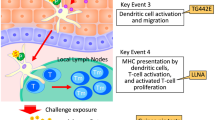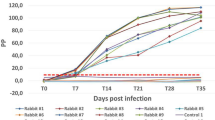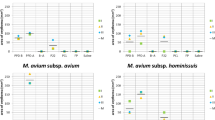Abstract
IT is well known that the ‘delayed’ or ‘infectious’ type of sensitivity is induced in a normal organism, after contact with living or killed tubercle bacilli, but it is not passively transferred by means of serum or extracts of organs from ‘allergic’ animals. This type of sensitivity is also induced in vitro by a mixture of ‘purified wax’ and tuberculoprotoin and in vivo by transferring leucocytes from ‘allergic’ donors. The intensity of the sensitivity proved to depend on the percentage of mononuclear cells present in the leucocytic suspension. By disrupting the ‘sensitized’ cells, a component resembling an antibody of the plasma fraction called ‘IV–10’ fr. or an α-globulin was released, which was found to induce a ‘delayed’ sensitivity.
This is a preview of subscription content, access via your institution
Access options
Subscribe to this journal
Receive 51 print issues and online access
$199.00 per year
only $3.90 per issue
Buy this article
- Purchase on Springer Link
- Instant access to full article PDF
Prices may be subject to local taxes which are calculated during checkout
Similar content being viewed by others
References
Hsu, H. S., and Kapral, F. A., Amer. Rev. Resp. Dis., 81, 881 (1960).
Author information
Authors and Affiliations
Rights and permissions
About this article
Cite this article
OPRESCU, C. Induction of ‘Delayed’ Hypersensitivity. Nature 193, 492–493 (1962). https://doi.org/10.1038/193492a0
Issue Date:
DOI: https://doi.org/10.1038/193492a0
This article is cited by
Comments
By submitting a comment you agree to abide by our Terms and Community Guidelines. If you find something abusive or that does not comply with our terms or guidelines please flag it as inappropriate.



